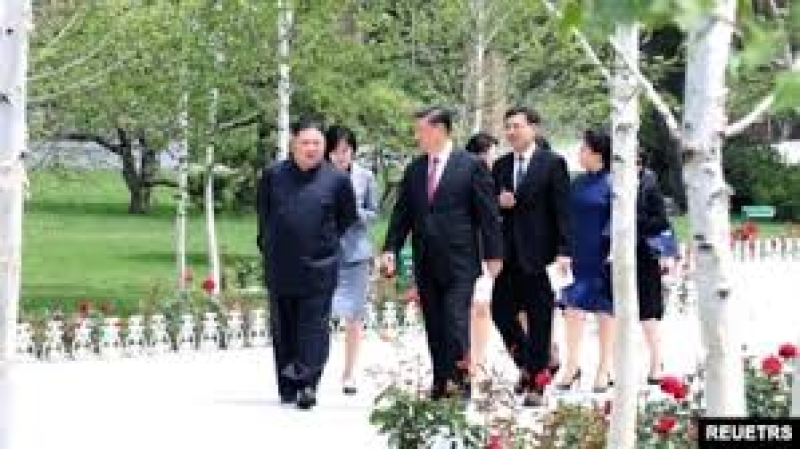- Stocks end week sharply lower as DSE, CSE indices tumble |
- 'Not all collections in the road transport sector is extortion': Sk Rabiul |
- Zubaida, Zaima take iftar with orphan students |
- Dhaka ranks second among world’s most polluted cities Friday |
- Dhaka to maintain ties with all countries with dignity |
Analysts see signs of strain in north Korea-China ties

Tensions between North Korea and China surfaced publicly this week for the first time in years, after Pyongyang lashed out at a joint statement signed by Beijing mentioning the possibility of denuclearization.
The apparent rift between the two allies emerged as North Korea’s latest attempt to launch a military spy satellite interrupted a major diplomatic initiative by China.
North Korea announced that it would conduct the launch as China’s premier, Li Qiang, was in Seoul preparing to meet the top leaders of Japan and South Korea as part of a trilateral dialogue that had not occurred in almost five years.
The launch, which ended in a fiery explosion just after liftoff, occurred several hours after the trilateral dialogue wrapped up late Monday, reports VOA.
Although not unprecedented, it was a rare North Korean disruption of a major political event involving China, which has long been the main ally and economic lifeline for the isolated North.
The developments suggest fissures in a relationship that both sides have long insisted is “as close as lips and teeth,” according to Jean Lee, a Korea specialist at the East-West Center in Hawaii.
“I think what we’re seeing is that those fissures can break wide open with just a little bit of pressure,” she said.
Uncomfortable spot
North Korea’s actions left China's Li in an awkward position, standing alongside Japanese Prime Minister Fumio Kishida and South Korean President Yoon Suk Yeol, who both condemned the impending launch.
Things got more uncomfortable from there. After the three men released a joint statement calling, among other things, for the denuclearization of the Korean Peninsula, North Korea erupted.
In a statement posted in the state-run Korean Central News Agency, North Korea's foreign ministry accused the three countries of “mockery and trickery,” denouncing what it described as a “blatant challenge” to its sovereignty and “wanton interference” in its internal affairs.
Though the North Korean statement was primarily directed at summit host South Korea, it was also a “veiled but undeniable swipe” at China, said Rachel Minyoung Lee, a North Korea watcher and senior fellow at the Washington-based Stimson Center.
“The North’s relations with China have looked to be cooling over the last year, but this is the first time in recent years any signs of trouble have broken into the open,” she wrote in a blog post on 38 North, a North Korea-focused website.
China has long called for the denuclearization of the Korean Peninsula – a formulation often embraced by other countries, including the United States and its allies.
North Korea has also accepted the idea of denuclearization in some settings, including perhaps most notably the joint statement signed by North Korean leader Kim Jong Un and former U.S. president Donald Trump following their first summit in 2018.
However, North Korea last year enshrined nuclear weapons in its constitution – a status Kim now calls “irreversible.”
North Korea's moves have sparked major concerns among the U.S. and its allies, which have responded by ramping up their own displays of military strength.
In public settings, Chinese officials have called for all sides to show restraint, even while pressing the United States to make concessions in order to advance the denuclearization process.
Ups and downs
North Korea has not criticized China so blatantly since 2017, when Beijing backed United Nations Security Council sanctions over the North’s nuclear and missile tests.
Since then, North Korea-China ties have improved. China now opposes new sanctions, even as North Korea dramatically expanded its ballistic missile tests that are banned by the U.N. resolutions it once supported.
But there have been signs of trouble beneath the surface. For instance, Chinese leader Xi Jinping hasn’t met with Kim in over five years.
Meanwhile, Kim in September traveled to Russia's far east, where he agreed to expand military cooperation with President Vladimir Putin. According to Kremlin officials, plans are underway for Putin to soon visit North Korea.
Putin now uses North Korean missiles and other weapons to wage war in Ukraine. In return, Putin may be aiding North Korea’s nuclear weapons program, according to some U.S. officials, who have not provided evidence.
Some analysts say China may be uncomfortable if Russia is enabling a significant nuclear buildup on its border — which may explain some of the current tensions.
China may also be trying to show that it is not as close to North Korea – and to Russia – as some Western nations imply, according to Ramon Pacheco Pardo, a professor of international relations at King’s College London.
“Kim Jong Un would have been invited already – or would have essentially been dragged to China to meet Xi Jinping. And this hasn’t happened,” said Pacheco Pardo.
That stands in contrast to the past, when Xi went out of his way to demonstrate that he was the world leader with the closest relationship to Kim, Pacheco Pardo added.
North Korea’s actions this week suggest it has been emboldened by its cooperation with Russia and now wants to demonstrate some level of independence from Beijing, he said.
However, analysts have questioned whether Russia's current level of support for North Korea will outlast its war in Ukraine.
While North Korea appears to be less reliant on China for now, Pacheco Pardo said, “in the future, it might be different.”

